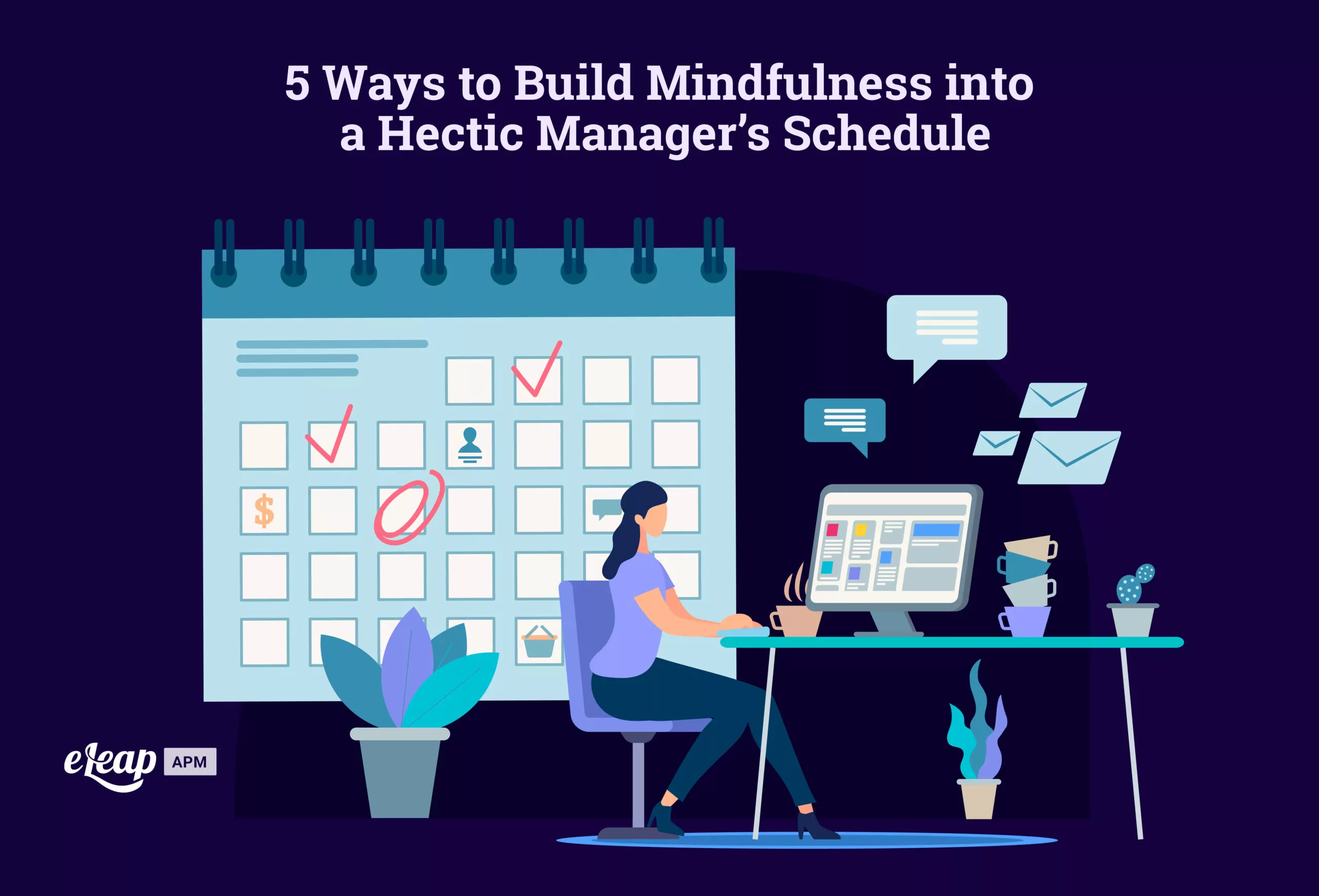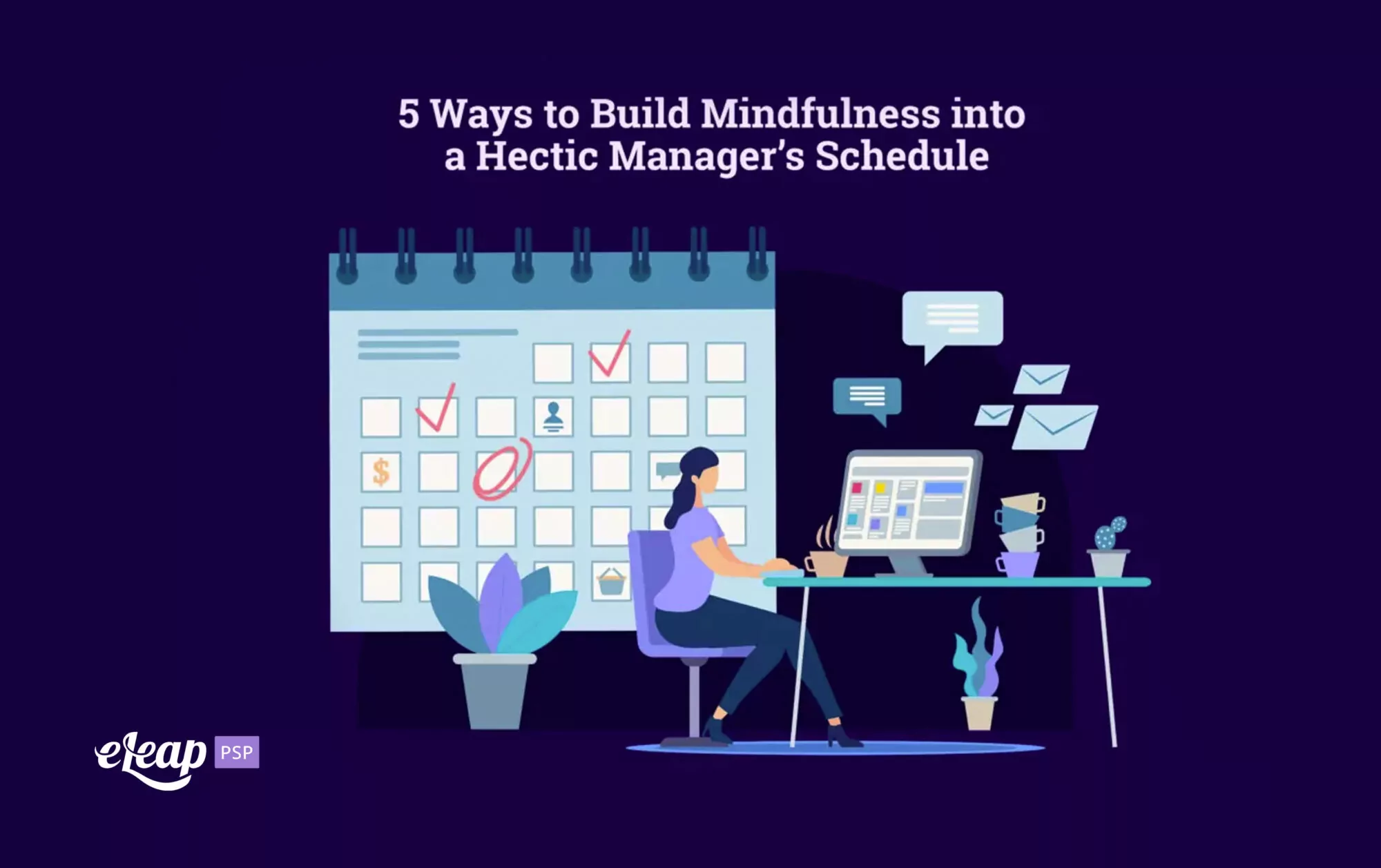5 Ways to Build Mindfulness into a Hectic Manager’s Schedule

Mindfulness has become something of a buzzword today. Once relegated to Zen Buddhist circles and yoga studios, the practice has exploded. You’ll find Olympic athletes doing mindfulness training, police officers building these practices into their lives, and successful CEOs trying to be more mindful every single day.
Mindfulness, far from being simply a catchword, is a powerful tool that allows you to reduce stress, focus on living life one moment at a time, and truly experience the present moment. It can also help make you a better manager if you’re able to build it into your schedule. That’s the challenge – how do you make time for mindfulness practice when it feels like your every moment is taken up with putting out fires or course-correcting employees?
In this post, we will explore five ways to build mindfulness into even the most hectic of managerial schedules. There is simply no reason that you cannot experience the profound calming effect, stress reduction, and amplified joy that comes from being mindful.

1. Focus on Your Breath
Our first tip is arguably the most important, yet the simplest to implement into your life. The core of mindfulness practice is to focus on your breathing – in, out, in, out – while allowing your thoughts to rise and fall on their own, without attaching any sort of judgment to them or becoming entangled in them. The beauty of this is that you can start anywhere, anytime.
To try this, just stop what you’re doing. You can close your eyes or leave them open. Breathe in and feel the air moving past your nostrils, through your nose, down the throat, and into the lungs. Feel your belly rise as you inhale.
Next, breathe out. Feel your belly contract, your lungs releasing, and the warm air moving out of your body. Focus on the feel of your breath wherever it is most noticeable – the edge of your nostrils, the back of your throat, or anywhere else.
Repeat this process for a few moments. That’s it! You’ve just completed a brief mindfulness training. Build more moments like that into your day as you can.
2. Pause Before You React
One of the most important benefits of mindfulness training is that it helps you create a space between your stimuli and your reactions. That brief momentary pause between your brain receiving information and processing it and your mind and body reacting can be the difference between being mindful and being unmindful. A simple pause can have profound transformative effects on your relationship with your team and throughout the rest of your life.
How might that work? Just before you react, whether it’s a verbal or physical reaction, stop. Think. Transform your original intent into something different. Look deeper into the stimulus that caused the reaction – how might you achieve a positive outcome with your words or actions?
That simple, momentary pause can allow you to spare hurt feelings, limit harsh speech, and even notice things you might have otherwise missed that allow you to react more appropriately to a situation or individual.
3. Do One Thing at a Time
It’s easy to feel overwhelmed. As a manager, you have a million and one things to do and they all needed to be done yesterday. That leads to immense pressure and before you know it, you’re frustratedly rushing through your day, moving from task to task to task. Then it’s done and you reflect back on the day, but it’s just one big blur.
Instead, focus on doing one thing at a time. Right now, I’m having a check-in with Jason. Right now, I’m helping Mallory determine what she needs to learn to more effectively serve our customers. Right now, I’m working with Aileen to determine why this particular project began skewing off track and what we need to do to bring it back in line.
Combine that one-task-at-a-time focus with your breathing practice. You’ll find that your stress begins to reduce and that you’re able to bring your best self to bear on what you’re doing. When you look back on the day, it won’t be one blur of frustration or anger, but a cohesive path of progress.
4. Learn to Listen to Your Body
Some people grind their teeth when they’re feeling stressed. Others carry tension in other parts of their body – their shoulders, the backs of their heads, their clenched fists. Most do it without even realizing it.
Recognize these signs for what they are: evidence of stress. Then, once you’ve recognized them, breathe and release that tension. Let go of the stress in your shoulders. Unclench your jaw or fists. Breathe in, and then let the stress flow out with the outbreath.
When your body feels less stressed, your mind can function more clearly. You’re able to manage more effectively and compassionately, too. It’s a win-win for everyone.
5. Listen Mindfully to Others
That hectic managerial schedule makes it tough to pay attention when a team member is talking. You’re present in body, perhaps even nodding at the appropriate points, but you’re not really listening. It’s tempting to think that this is fine, you’re getting the gist of what they’re saying, right?
Wrong. If you are not listening to the other person, it shows. They know that you’ve checked out and that tells them you don’t value their input, experience, or concerns. It also puts you at a disadvantage because you’re missing key pieces of information.
Instead of letting your worries and other tasks take you out of the conversation, use your breath to bring you back. Breathe in and listen. Breathe out and focus on the person in front of you. What are they saying verbally? What is their body language saying? What does their facial expression communicate?
A More Mindful You
Mindfulness might not seem like much – focusing on the breath isn’t rocket science. However, its profound transformative effects cannot be denied. With a few simple beginning steps, you can use this practice to become a better manager and even improve the quality of your own life.